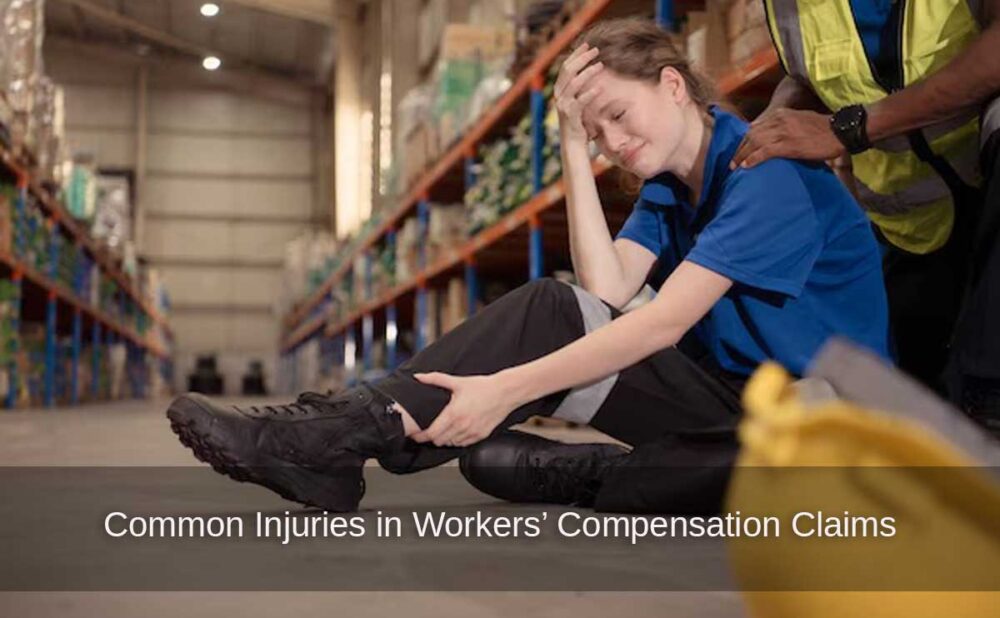Common Injuries in Workers’ Compensation Claims
Workers’ compensation claims encompass a broad spectrum of injuries, reflecting the diverse hazards that exist across various workplace settings. Recognizing these injury types is essential for both employees and employers to implement preventive strategies and respond effectively when incidents occur. The following are several common injuries frequently reported in workers’ compensation claims:
Repetitive Strain Injuries (RSIs)
Repetitive strain injuries stem from the continuous use of specific body parts, often triggered by repetitive tasks or poor workplace ergonomics. Common manifestations of RSIs include:
- Carpal Tunnel Syndrome. Compression of the median nerve in the wrist.
- Tendonitis. Inflammation of tendons due to overuse.
- Bursitis. Inflammation of the bursae, the small sacs of fluid that cushion bones.
These conditions are prevalent among office personnel, assembly line workers, and others engaged in repetitive motions.
Slips, Trips, and Falls
Accidents involving slips, trips, and falls can occur in any work environment, leading to injuries that range from minor bumps and bruises to serious fractures and head trauma. Contributing factors often include:
- Wet or slippery floors
- Uneven walking surfaces
- Cluttered environments
- Insufficient lighting
Back and Neck Injuries
Injuries affecting the back and neck—such as sprains, strains, and herniated discs—are commonly seen in roles that involve heavy lifting, bending, or extended periods of sitting or standing. These injuries can result from a single event or accumulate over time.
Burns
Burns can occur in environments where hot materials, chemicals, electrical equipment, or fires are present. The severity of burn injuries varies significantly; some might be minor while others could necessitate extensive medical treatment.
Crush Injuries
Crush injuries can result from falling objects, being struck by heavy machinery, or accidents with tools. Environments such as construction sites, warehouses, and manufacturing facilities are especially prone to these hazards, often leading to severe fractures and other serious injuries.
Puncture Wounds, Cuts, and Lacerations
Workplace tools and machinery with sharp edges can cause cuts and lacerations. While some wounds may be superficial, others can penetrate deeply enough to pose infection risks or require surgical care.
Head Injuries
Head trauma—including concussions and traumatic brain injuries (TBIs)—can have significant short-term and long-term effects on individuals. These injuries often stem from falls or being hit by objects at work.
Hearing Loss
Employees exposed to loud environments without appropriate hearing protection can suffer from temporary or permanent hearing loss. Industries like construction, manufacturing, and aviation are particularly vulnerable to this type of injury.
Occupational Diseases and Conditions
Occupational diseases develop over time as a result of exposure to harmful substances or unhealthy working conditions. Examples include:
- Asbestosis and Mesothelioma. Lung diseases linked to asbestos exposure.
- Occupational cancers. Resulting from exposure to carcinogens.
Workers exposed to dust, fumes, or chemicals may develop respiratory issues, ranging from chronic bronchitis to severe conditions like lung cancer.
Understanding the prevalence of these injuries can lead to improved safety protocols and preventive measures.
Common industries where workplace accidents frequently occur include:
- Construction
- Transportation
- Warehousing
- Manufacturing
- Mining
- Healthcare
- Social Assistance
- Food Processing
Timely intervention through appropriate workers’ compensation claims can also enhance outcomes for those injured on the job.
Common Causes of Workplace Accidents
Workplace accidents can arise from various factors, including:
- Motor vehicle accidents
- Explosions
- Excavation accidents
- Slip-and-fall incidents
- Falls from heights
- Defective equipment
- Being struck by falling objects
- Structural collapses
- Overexertion
- Electrocution
- Exposure to hazardous materials
Certain occupations inherently carry greater risks than others. Whether an accident involves slipping in an office setting or falling off scaffolding on a construction site, our Atlanta workers’ compensation attorneys stand ready to assist you.





